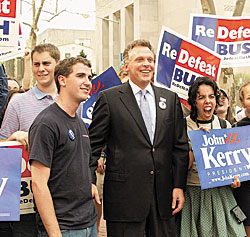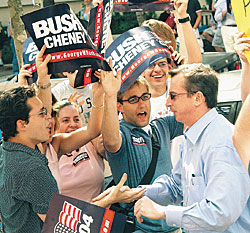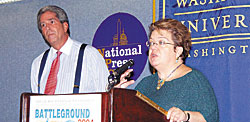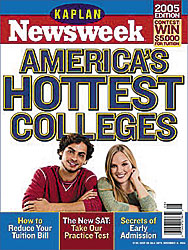|

Class of 2004 Commences on the Ellipse | New Program Addresses Student Writing Skills | The Ultimate Challenge | Lighting up the Basketball Season | Arabic Studies Summer Program | Faculty Focus | Election 2004 | The Students' Ivory Tower | GW Honors Top Donors | High-Tech Hideaway | The J Street Scene | Reagan's GW Legacy | GW Welcomes Five New Trustees | The Mysteries of Megiddo | At a Glance | GW in History

Election 2004: Campaigns, Elections, and Politics at GW
MTV Brings Election Coverage to Campus

On April 19, Democratic National Committee Chairman Terry McAuliffe and Republican National Committee Chairman Ed Gillespie spent time with GW students—and voters—after a press conference during which they helped to announce an MTV-sponsored contest to choose young adult speakers to address their parties’ national conventions.
Photo by Claire Duggan

Photo by Claire Duggan
|
MTV News correspondent Gideon Yago, Republican National Committee Chairman Ed Gillespie, Democratic National Committee Chairman Terry McAuliffe, and rock band Third Day descended on campus April 19 to announce a pair of essay contests for young adults. The contests were designed to encourage political participation among 18- to 24-year-olds and were sponsored by MTV’s “Choose or Lose” campaign as well as the Democratic and Republican parties. GW was chosen as the ideal location to announce the nationwide contests.
Nathan Imperiale, an electronic media major at GW, was a finalist in the Republican National Convention’s essay contest, “Stand up and Holla.” Imperiale was one of 10 finalists who competed to present a speech live on prime-time television at the Republican National Convention in New York Aug. 30. The topic of the RNC’s contest was, “Why is the President’s call for community service important and how have you demonstrated it?” The winner of the “Speak Out for the Future” contest spoke at the Democratic National Convention in Boston in July on the topic, “Why should politics be important to youth and how can youth get more involved in the political process?”
The winners of both contests were selected through an online vote and were announced on MTV’s “Total Request Live.” The Internet voters watched short, taped segments of the essays posted on the RNC and DNC Web sites as well as on www.MTV.com.
—LE
Student Group Hails Voting Success
More GW students are registered to vote than ever before, thanks to a successful student-run initiative started last year. The student group GW Votes reports that for this year’s presidential election, more than 1,500 new student voters were registered as a result of its campaign. Overall, the group estimates that 95 to 98 percent of the total undergraduate population is registered, which is more than double the national average of 45 percent of people in the 18 to 24 age group who registered in the 2000 election.
A key part of the GW Votes effort was to increase the amount of absentee ballots that students submit. The group worked to not only register students but also help them to submit their absentee ballot requests on time.
To achieve its goals, GW Votes reached out to students at campus events and coordinated a series of “Dorm Storms” that featured student volunteers knocking on every residence hall door on the Foggy Bottom and Mount Vernon campuses. The initiative also launched a new Web site, www.gwvotes.org, allowing students access to registration and absentee ballot request forms from all 50 states.
GW Votes wrapped up its efforts with an Election Day party, with events that included a Texas vs. Massachusetts BBQ, political sidewalk chalking, make your own campaign T-shirt stations, and result watching parties.
 Professors Lecture on Electoral College Professors Lecture on Electoral College
Professors Daniel Ullman and E. Arthur “Robbie” Robinson of the Department of Mathematics took time out of their schedules one morning to discuss the quirks of the United States’ presidential voting system at an Aug. 19 event titled “Mathematicians Critique the U.S. Political System.”
The talk focused, as Ullman said, on three areas “where math and politics overlap”: apportionment, the Electoral College, and presidential races with more than two candidates.
While the Constitution says apportionment should be determined by each state’s population, the professors said the Constitution doesn’t give a clear idea of exactly how that should be done. The professors said the use of the current method is hard to defend, as it is somewhat arbitrary in the way it rounds fair shares to whole numbers. For example, Maryland’s fair share of representatives should be 8.2, but it is impossible to have .2 of a representative.
The Electoral College is an outdated method of determining the will of the people in the electoral process, the professors said. They explained the Banzhaf Power Index, a mathematical measure created in the 1960s by GW Law Professor John Banzhaf III that equates how likely it is that a voter will cast a deciding vote for an election. The goal is to see whether the likelihood of a voter casting a deciding vote is similar in different states. They said the Electoral College also fails the anonymity property, which says that no matter who or where you are, your vote should be counted equally. As one journalist who attended the event pointed out, the Electoral College system also does not promote voter turnout because, for example, California gets 55 electoral votes no matter how many people come to the polls.
“It’s easy to advocate against the Electoral College. It seems to be a relic and makes no sense,” Ullman said.
Ullman said no matter how you look at it, the current electoral system doesn’t add up. “We have a curious voting system. We start with apportionment, which we do in a strange way. Then we have the electoral system based on that apportionment, and that has its strange aspects, too. And besides that, we would have to deal with which method we use to discern the will of the people, if people were to give us their full realm of choices.”
—LE

GW Sponsors 2004 Battleground Poll

Republican and Democratic pollsters of the GW-Battleground 2004 Poll: Ed Goeas of the Tarrance Group and Celinda Lake of Lake Snell Perry and Associates.
Photo by Claire Duggan
|
In April, GW became the sponsor of the 2004 Battleground Poll, a prominent, bipartisan election survey conducted by polling firms Lake Snell Perry and Associates and the Tarrance Group.
The poll was created in 1991 and has since been cited by the media as a reliable source of information on national opinion and voters’ intentions. It is a series of scientific surveys unique to the polling industry because it offers the perspectives of pollsters from the Republican and Democratic Parties. They are conducted to give the public a look at the opinions of Americans and an inside view at strategic recommendations for both parties.
The study was renamed “The George Washington University Battleground Poll,” and GW’s Gelman Library is the official archive for all the Battleground Polls conducted to date, as well as in the future.
The partnership brings several benefits to the University, says Christopher Arterton, dean of GW’s Graduate School of Political Management.
“The data gathered from the poll can be used in our public opinion classes, so our political communications, political management, and political science students will benefit from the information,” Arterton says. “In many polls, a set of questions is asked just once, and gives only a snapshot of how the respondents feel. Because this poll asks the same questions at different periods in time, it gives some historical context to the answers. It’s a more comprehensive poll.”
Arterton says GW also will gain higher visibility as a result of being the home of the Battleground Poll.
“The poll marries well with ‘Crossfire,’ our academic programs, and our location,” Arterton says. “This gets our name out there and gives GW a higher level of recognition.”
As well as indicating current front-runners in the election, the GW-Battleground Poll illustrates how the public views each candidate, which issues are of greatest concern to voters, and which candidate voters feel can best address major issues. This year’s poll surveyed 1,000 registered likely voters nationwide and yields a margin of error of +3.1%.

GW Named “Hottest University for Political Junkies”
 It may not come as a surprise to members of the GW community that the University was named “The Hottest University for Political Junkies” in the 2005 Kaplan/Newsweek How to Get into College guide. The publication praised GW for making academics and politics come alive in the classroom and throughout campus. This is the second time in the last three years that GW was chosen as a “Hot School.” It may not come as a surprise to members of the GW community that the University was named “The Hottest University for Political Junkies” in the 2005 Kaplan/Newsweek How to Get into College guide. The publication praised GW for making academics and politics come alive in the classroom and throughout campus. This is the second time in the last three years that GW was chosen as a “Hot School.”
“There aren’t many universities that hosted John Kerry, Tom Ridge, foreign diplomats, U.S. ambassadors, and government officials for speeches and campus programs in a single academic year,” says GW President Stephen Joel Trachtenberg. “However, at GW students expect and receive attention from those in the global political arena.”
Interest in GW is rapidly increasing, as the University received a record 20,000 applications for this academic year and welcomed a freshman class of about 2,600. While students are drawn to programs across all disciplines, the guide says there are many reasons the University is attractive to “political junkies.” The University’s political reputation is based on numerous internship opportunities with government agencies, non-profits, and policy and advocacy groups; drawing guest speakers of international acclaim; study abroad programs; and faculty members who often engage in political consulting. “Professors often consult for the government, which gives their perspective a practical edge,” the guide says.

|